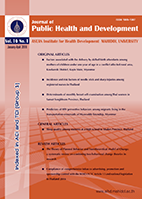The Theory of Planned Behavior and Transtheoretical Model of Change: a systematic review on combining two behavioral change theories in research
Main Article Content
Abstract
This systematic review aimed to explore how researchers combined two behavioral change theories: the Theory of Planned Behavior (TPB) and the Transtheoretical Model of Change (TTM). Study I used data collected from the Web of Science by search through keywords, titles and abstracts. Total 53,865 key terms were extracted and analyzed by Bibliography Network Analysis to explore the research trend. Study II reviewed full-text articles to find 2 models utilization in EBSCO database. According to the PRISMA guidelines, this systematic review, under its exclusion criteria, included totally 9 remained articles.
The results showed that the combination of theories TPB and TTM were in 5 different methods: 1) Explore and explain health behavior comprehensively, 2) Use to classify related health behaviors into different stages, 3) use to develop survey questions, 4) Use to predict health behavior changed and 5) Making new modules. In conclusion, this review could be the researchers’ applying guidelines totally 5 different methods of both theories combining.
Based on the present study, the review of effectiveness in combining theories or how the researchers measured and conducted theoretically revealing analyses or meta-analysis was suggested for the future review.


